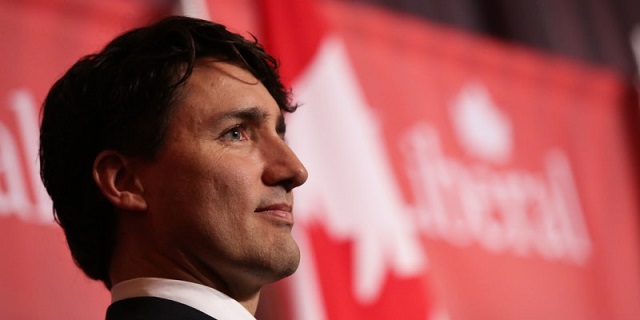Economy
Ottawa’s cap-and-trade plan long on costs, light on environmental benefits

From the Fraser Institute
” the Trudeau government’s new plan would reduce an already unmeasurable climate benefit to one even less measurable “
On Thursday, the Trudeau government unveiled its plan to cap greenhouse gas emissions from Canada’s oil and gas sector. The plan calls for a “cap-and-trade” system rather than a mandatory hard cap on emissions.
A previous plan would have required the oil and gas sector to reduce emissions by 42 per cent (from 2019 levels) by 2030. The new plan calls for a 35 per cent to 38 per cent cut (again, compared to 2019 levels by 2030). So the government has somewhat softened the target. However, the slight change is unlikely to improve the cost/benefit analysis for the sector or affected provinces.
As noted in a study published earlier this year, the Trudeau government’s previous plan would have resulted in at least $45 billion in revenue losses for the oil and gas sector in 2030 alone, which would imply a significant drop resource royalties and tax revenue for governments. And costs would ripple farther out from the oil and gas sector, into the plastics and petrochemical sectors, imposing more costs and threatening the employment of many Canadian workers in those sectors.
Crucially, according to the study, this economic gain would come with little or no environmental benefit. While the reductions would be large when only considering Canada’s oil and gas sector, the impact on climate change, which is a matter of global GHG concentrations, would be virtually nonexistent. The government’s previous plan called for Canada to reduce GHG emissions by 187 megatonnes in 2030, which would equate to four-tenths of one per cent of global emissions and likely have no impact on the trajectory of the climate in any detectable manner and hence offer equally undetectable environmental, health and safety benefits. In other words, the Trudeau government’s new plan would reduce an already unmeasurable climate benefit to one even less measurable.
And now, there are serious questions if the new plan will deliver even the miniscule climate benefit mentioned above. Under a cap-and-trade scheme, companies can trade in emission offsets if they’re unable to reduce emissions via their own technological processes, and to avoid cutting oil and gas production. But emission offset schemes are deeply dodgy.
As noted in a Guardian investigation of Verra, the world’s leading offset market—basically, organizations that reduce carbon in the atmosphere by tree-planting and other initiatives—more than 90 per cent of Verra’s rainforest offset credits (among the most commonly used by companies) are likely “phantom credits” and do not represent genuine carbon reductions. And as reported in the ultra-green Grist, rainforest credits are not the only bogus game in town. “In reality… the market for these offsets is ‘riddled with fraud,’ with offset projects too often failing to deliver their promised emission reductions.”
Canada’s domestic carbon offset market may be more robust than in other countries, but there’s no guarantee. If a significant share of Canada’s offsets prove to be as bogus as the international norm, GHG reductions from the oil and gas sector might be smaller still.
The Trudeau government’s new GHG cap on the oil and gas sector is a moderate improvement over the previous plan. The cap is a bit less stringent, and therefore might be easier to attain. And the use of cap-and-trade rather than a hard cap will give the oil and gas industry more flexibility, and more importantly, allow it to avoid curtailing production to satisfy the cap. But the plan still fails a critical cost/benefit analysis. It remains quite high in potential costs for Canada’s oil and gas sector, particularly in provinces which produce the most oil and gas, yet will deliver environmental benefits that are too small to measure.
Author:
Economy
What the Data Shows About the New Canada-Alberta Pipeline Opportunity

From Energy Now
By Canada Powered by Women
Canada has entered a new period of energy cooperation, marking one of the biggest shifts in federal–provincial alignment on energy priorities in years.
Last week as Prime Minister Mark Carney and Alberta Premier Danielle Smith signed a memorandum of understanding (MOU) that outlines how both governments will approach a potential pipeline to British Columbia’s coast.
The agreement, which has been described as a “new starting point” after years of tension, lays the groundwork for a privately financed pipeline while also linking this commitment to a broader set of infrastructure priorities across oil and gas, LNG, renewables, critical minerals and electricity transmission.
It also sets out how a privately financed project, moving roughly 300,000 to 400,000 barrels of oil to global markets each day, will be reviewed.
Now that the announcement is behind us, attention has turned to how (or if) a pipeline is going to get built.
Alberta has set out its ambitions, British Columbia has its conditions, and the federal government has its own expectations. Together, these positions are shaping what some are calling a “grand bargain” which will be made up of trade-offs.
Trade-offs are not a new concept for the engaged women that Canada Powered by Women (CPW) represents, as they’ve been showing up in our research for several years now. And anyone who reads us also knows we like to look at what the data says.
According to new polling from the Angus Reid Institute, a clear majority of Canadians support a pipeline, with national backing above 60 per cent. And there’s strong support for the pipeline among those in B.C. This aligns with other emerging data points that show Canadians are looking for practical solutions that strengthen affordability and long-term reliability.
By the numbers:
• 60 per cent of Canadians support the pipeline concept, while 25 per cent oppose it.
• 53 per cent of people support in British Columbia, compared to 37 percent opposed.
• 74 per cent of people in Alberta and Saskatchewan support the pipeline.

Our research shows the same trends.
A large majority (85 per cent) of engaged women agree that building pipelines and refining capacity within the country should be prioritized. They favour policies that will progress stability, affordability and long-term economic opportunity.
A key feature of the MOU is the expectation of Indigenous ownership and benefit sharing, which Alberta and B.C. governments identify as essential, and which aligns with public opinion. As of right now, Indigenous groups remain split on support for a pipeline.
The agreement also signals that changes to the federal Oil Tanker Moratorium Act may need to be considered. The moratorium, in place since 2019, is designed to limit large tanker traffic on the North Coast of B.C. because of navigation risks in narrow channels and the need to protect sensitive coastal ecosystems.
Those in favour of the pipeline point to this as a critical barrier to moving Canadian oil to international markets.
Polling from the Angus Reid Institute shows that 47 per cent of Canadians believe the moratorium could be modified or repealed if stronger safety measures are in place. Again, we come back to trade-offs.
The MOU is a starting point and does not replace consultation, environmental review or provincial alignment. These steps are still required before any project can advance. Taken together, the agreement and the data show broad support for strengthening Canada’s energy options.
This will be an issue that engaged women are no doubt going to watch, and the conversation is likely to move from ideas to discussing what trade-offs can be made to bring this opportunity to life.
Business
US Energy Secretary says price of energy determined by politicians and policies


From the Daily Caller News Foundation
During the latest marathon cabinet meeting on Dec. 2, Energy Secretary Chris Wright made news when he told President Donald Trump that “The biggest determinant of the price of energy is politicians, political leaders, and polices — that’s what drives energy prices.”
He’s right about that, and it is why the back-and-forth struggle over federal energy and climate policy plays such a key role in America’s economy and society. Just 10 months into this second Trump presidency, the administration’s policies are already having a profound impact, both at home and abroad.
While the rapid expansion of AI datacenters over the past year is currently being blamed by many for driving up electric costs, power bills were skyrocketing long before that big tech boom began, driven in large part by the policies of the Obama and Biden administration designed to regulate and subsidize an energy transition into reality. As I’ve pointed out here in the past, driving up the costs of all forms of energy to encourage conservation is a central objective of the climate alarm-driven transition, and that part of the green agenda has been highly effective.
Dear Readers:
As a nonprofit, we are dependent on the generosity of our readers.
Please consider making a small donation of any amount here.
Thank you!
President Trump, Wright, and other key appointees like Interior Secretary Doug Burgum and EPA Administrator Lee Zeldin have moved aggressively throughout 2025 to repeal much of that onerous regulatory agenda. The GOP congressional majorities succeeded in phasing out Biden’s costly green energy subsidies as part of the One Big Beautiful Bill Act, which Trump signed into law on July 4. As the federal regulatory structure eases and subsidy costs diminish, it is reasonable to expect a gradual easing of electricity and other energy prices.
This year’s fading out of public fear over climate change and its attendant fright narrative spells bad news for the climate alarm movement. The resulting cracks in the green facade have manifested rapidly in recent weeks.
Climate-focused conflict groups that rely on public fears to drive donations have fallen on hard times. According to a report in the New York Times, the Sierra Club has lost 60 percent of the membership it reported in 2019 and the group’s management team has fallen into infighting over elements of the group’s agenda. Greenpeace is struggling just to stay afloat after losing a huge court judgment for defaming pipeline company Energy Transfer during its efforts to stop the building of the Dakota Access Pipeline.
350.org, an advocacy group founded by Bill McKibben, shut down its U.S. operations in November amid funding woes that had forced planned 25 percent budget cuts for 2025 and 2026. Employees at EDF voted to form their own union after the group went through several rounds of budget cuts and layoffs in recent months.
The fading of climate fears in turn caused the ESG management and investing fad to also fall out of favor, leading to a flood of companies backtracking on green investments and climate commitments. The Net Zero Banking Alliance disbanded after most of America’s big banks – Goldman Sachs, J.P. Morgan Chase, Citigroup, Wells Fargo and others – chose to drop out of its membership.
The EV industry is also struggling. As the Trump White House moves to repeal Biden-era auto mileage requirements, Ford Motor Company is preparing to shut down production of its vaunted F-150 Lightning electric pickup, and Stellantis cancelled plans to roll out a full-size EV truck of its own. Overall EV sales in the U.S. collapsed in October and November following the repeal of the $7,500 per car IRA subsidy effective Sept 30.
The administration’s policy actions have already ended any new leasing for costly and unneeded offshore wind projects in federal waters and have forced the suspension or abandonment of several projects that were already moving ahead. Capital has continued to flow into the solar industry, but even that industry’s ability to expand seems likely to fade once the federal subsidies are fully repealed at the end of 2027.
Truly, public policy matters where energy is concerned. It drives corporate strategies, capital investments, resource development and movement, and ultimately influences the cost of energy in all its forms and products. The speed at which Trump and his key appointees have driven this principle home since Jan. 20 has been truly stunning.
David Blackmon is an energy writer and consultant based in Texas. He spent 40 years in the oil and gas business, where he specialized in public policy and communications.
-

 Energy23 hours ago
Energy23 hours agoA look inside the ‘floatel’ housing B.C.’s LNG workforce
-

 International2 days ago
International2 days agoFBI may have finally nabbed the Jan. 6 pipe bomber
-

 COVID-191 day ago
COVID-191 day agoUniversity of Colorado will pay $10 million to staff, students for trying to force them to take COVID shots
-

 Energy23 hours ago
Energy23 hours agoELZABETH MAY HAS IT WRONG: An Alberta to Prince Rupert Oil Pipeline Will Contribute to Greater Global Oil Tanker Safety
-

 espionage2 days ago
espionage2 days agoDigital messages reportedly allege Chinese police targeted dissident who died suspiciously near Vancouver
-

 National23 hours ago
National23 hours agoAlberta will use provincial laws to stop Canadian gov’t from trying to confiscate legal firearms
-

 illegal immigration10 hours ago
illegal immigration10 hours agoWhile Trump has southern border secure, hundreds of thousands of illegal immigrants still flooding in from Canada
-

 Health2 days ago
Health2 days ago23,000+ Canadians died waiting for health care in one year as Liberals pushed euthanasia



